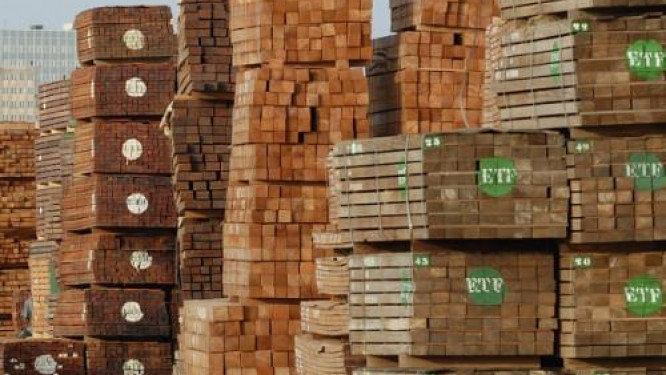Forestry Exploiters Demand Suspension Of 2nd And 3rd Quarter Royalty Payment Over COVID-19

The current COVID-19 pandemic has hit at the heart of the forestry exploitation establishment in Cameroon leading to the sacking of workers, reduction in working hours, cancellation of orders and a general drop in production.
To this end, forestry exploiters met on May 28 with the Minister of Forestry and Wildlife, Jules Doret Ndongo, to make certain demands on government which they think would help ameliorate the dire situation in which their sector finds itself currently.
According to the President of the Groupement de la Filiere Bois du Cameroun – Cameroon Timber Sector Grouping – Giorgio Giorgetti, the difficulties faced by forestry exploiters because of the COVID-19 pandemic have compounded the problems faced by the sector previously.
He said before now, the sector was passing through lean days because of the shock occasioned by a fall in demand for timber from Cameroon by Chinese customers, who were the principal buyers of Cameroonian timber.
The principal demand made by the forestry exploiters was that government suspend the payment of the second and third quota annual forestry royalties for 2020.
The royalties net a total of nine billion FCFA (18 million dollars) annually into the Cameroonian national treasury.
They are paid quarterly and are different from normal business taxes which the forestry exploiters pay annually.
While the Ministry of Forestry and Wildlife might be disposed to look favourably at the demands of the forestry exploiters in view of the fact that other business operators are benefitting from palliative measures put in place by government to cushion the effects of the coronavirus outbreak on businesses, public opinion does not seem to favour the group.
Many believe timber exploiters cause so much destruction on the eco-system leading to a depletion of the national forest reserves.
They say the exploiters brazenly flout conservation regulations for protecting the eco-system.
“Most of the adverse effects of climate change on Cameroon are caused by the wanton destruction of our forests by unscrupulous timber exploiters who use the billions they rake in annually to corrupt regulatory agents into looking the other way while they butcher our forests,” said sociologist Eric Kombey Wolete.
But officials in the Ministry of Forestry and Wildlife insist allegations of bribery and corruption against their agents are baseless.
However, one official who pleaded anonymity because he is not the official spokesperson for the ministry, said “denials of corrupt practices in our ministry do not mean there may not be rotten seeds within the ministry.”
Support Our Journalism
There are millions of ordinary people affected by conflict in Africa whose stories are missing in the mainstream media. HumAngle is determined to tell those challenging and under-reported stories, hoping that the people impacted by these conflicts will find the safety and security they deserve.
To ensure that we continue to provide public service coverage, we have a small favour to ask you. We want you to be part of our journalistic endeavour by contributing a token to us.
Your donation will further promote a robust, free, and independent media.
Donate HereStay Closer To The Stories That Matter




